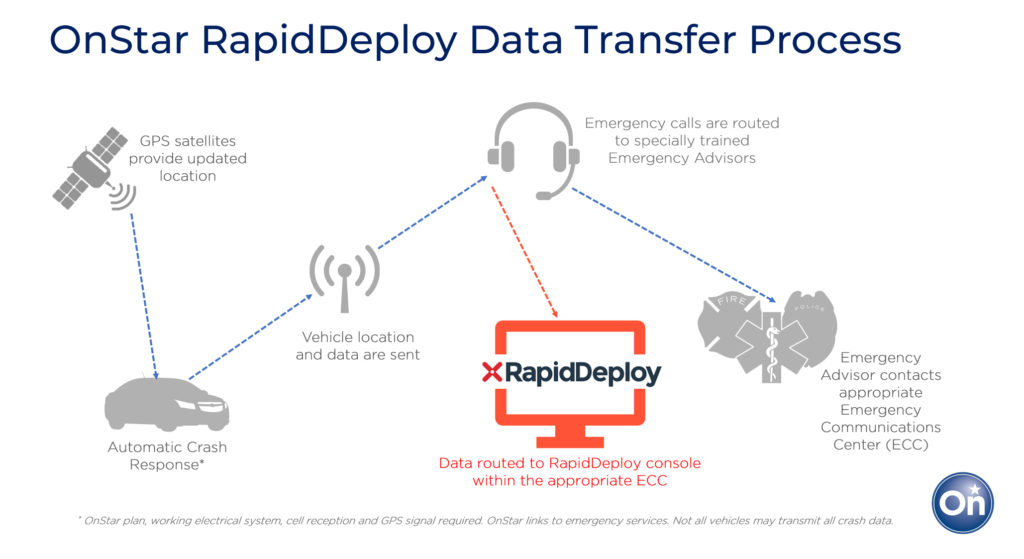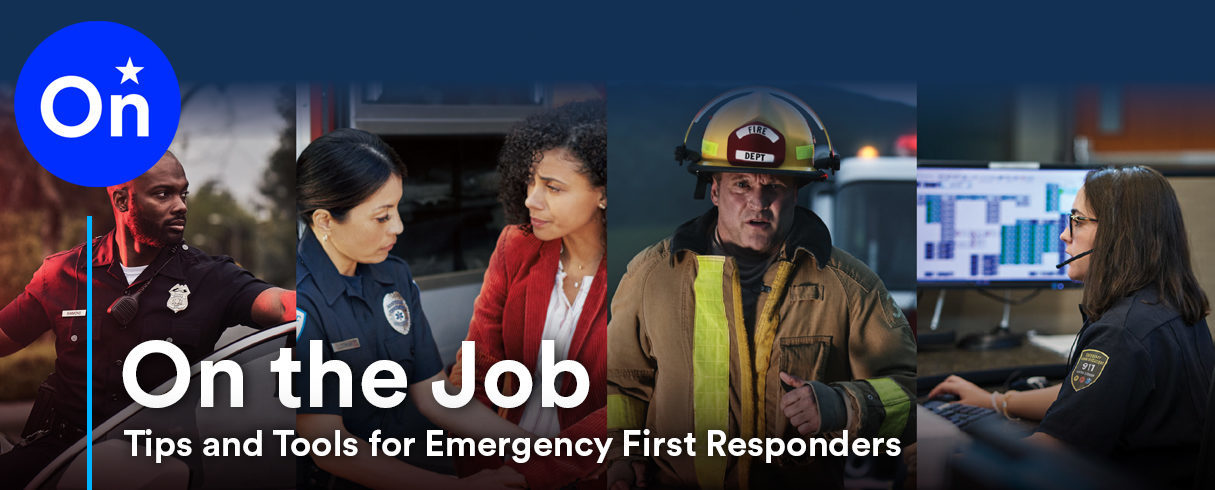As a first responder, you know Good Samaritans and non-involved reporting parties may not always accurately report the severity of a crash or resources needed at the scene. A vehicle may appear to be extensively damaged with deployed airbags, so the public may assume there are injuries and request that police, fire and EMS be sent to a scene. Units may be sent priority to the scene only to discover there are no injuries and the only resources needed are an officer to take an accident report and a tow truck to clear the scene. Looks can be deceiving, which is why additional data and a connection to the occupants are invaluable.
OnStar-equipped vehicles with Automatic Crash Response (ACR) 1 have built-in sensors to automatically alert an OnStar Advisor of a crash. Now, the incident location and related crash details can be provided electronically to the appropriate Emergency Communications Center (ECC).

OnStar has been receiving additional data from vehicles in crashes since 2004 and, over time, the data set has grown in sophistication. OnStar Advisors have a great deal of information they can share about crash incidents, including:
- Location, with latitude and longitude
- Vehicle type — including make, model, color and year — and fuel type (such as an electric vehicle)
- Crash data, such as airbag deployment, multiple impacts, principle direction of force, whether seat belt pretensions have deployed, or if a front seat passenger is present
- Injury Severity Prediction (ISP) 2
All of this data can help guide decisions on dispatch priority, patient care and transport of the patient, including where to transport and by what means — ground or air. But the issue continues to be that, in busy ECCs, call takers may not have time to receive this information verbally, enter it into their Computer Aided Dispatch (CAD) system and then relay it to first responders.
OnStar understands this challenge, which is why we’ve formed a valuable new partnership with RapidDeploy — one of the industry’s top integrated response platforms — to send crash data electronically to their platform, where it can be utilized in an ECC as part of California’s future NG911 implementation. RapidDeploy’s cloud-based Next-Generation 911 technology will transmit the OnStar data to the ECC as soon as OnStar has validated the need for emergency response.

RapidDeploy’s cloud-based Next-Generation 911 technology will transmit the OnStar data to the ECC as soon as OnStar has validated the need for emergency response.
The transmitted data sent to California’s ECCs from RapidDeploy will include this crash-related information:
- Location where crash occurred (latitude/longitude, state/province, county)
- Incident number
- Incident received time
- Sent time (time appears on advisor screen)
- Vehicle make, model, year and color
- Crash detected (data, if applicable)
-
- High probability of severe injury indicator
- Airbag deployment indicator
- Principal direction of force (direction of impact)
- Multiple impacts indicator
- Autonomous vehicle indicator
- Specific engine types — electric vehicle, hybrid electric vehicle, internal combustion engine
“For over two decades, OnStar has been committed to working with public safety to transform emergency call processing,” says Catherine Bishop — Senior Manager, OnStar Global Emergency Services. “Our partnership with RapidDeploy will allow us to electronically transmit critical crash data directly into the Emergency Communications Centers’ ecosystems to facilitate more informed dispatch decisions and enhanced patient transport at crash scenes.”
“We are proud to work with OnStar to deliver telematics data to 9-1-1 as part of our Unified Critical Response platform,” says Steven Raucher, CEO and Co-founder of RapidDeploy. “Together, we will arm Telecommunicators and First Responders with additional context and situational awareness when they need it most, to save lives.”
To learn more about RapidDeploy, visit www.rapiddeploy.com.
- OnStar plan, working electrical system, cell reception and GPS signal required. OnStar links to emergency services. Not all vehicles may transmit all crash data. See onstar.com for details and limitations.
- OnStar plan, working electrical system, cell reception and GPS signal required. OnStar links to emergency services. See onstar.com for details and limitations.

